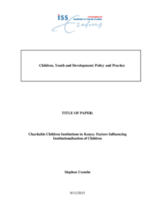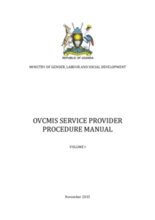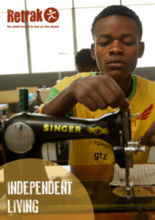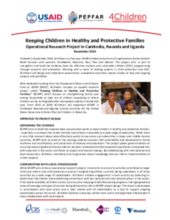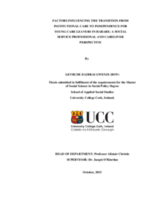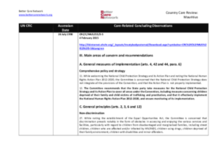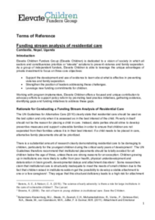Displaying 1091 - 1100 of 1622
This paper uses two approaches to understand the phenomenon of proliferation of children's institutions in Kenya.
Police in the Masaka District of Uganda have closed down an illegal orphanage for children under the age of 10, according to the article.
The OVCMIS is one of the key instruments for effecting implementation of the National Strategic Programme Plan of Interventions for orphans and other vulnerable children (NSPPI).
This literature review explores current international and selected national policy on independent living arrangements and examines the evidence of good practice from existing independent living programmes for care leavers in order to assess how both of the above can be applied to street-connected children.
This two-page brief from USAID describes the “Keeping Children in Healthy and Protective Families” project, a project that is part of 4Children that “focuses on strengthening family care among households at high risk of children separating or where children can be reintegrated after having been placed in residential care.”
Gerald Dean Campbell, a man from Texas, in the U.S., who served as a missionary in Malawi was arrested for “engaging in illicit sexual conduct in foreign places” and has admitted to sexually abusing 11 children at a children’s home in Malawi where he served as general manager from 1997-2009.
UNICEF Executive Director, the Special Representative of the Secretary-General for Children and Armed Conflict, the Special Representative of the Secretary-General on Violence against Children, and the Chairperson of the Committee on the Rights of the Child have issued a joint statement on Somalia’s ratification of the Convention on the Rights of the Child.
This study (a thesis submitted in fulfilment of the requirements for the Master of Social Science in Social Policy Degree at University College Cork, Ireland) explored the factors influencing the transition from care to independence in Harare, Zimbabwe.
This country care review includes the care-related Concluding Observations adopted by the Committee on the Rights of Persons with Disabilities and the Committee on the Rights of the Child.
The Elevate Children Funders Group is seeking a consultant to conduct a funding stream analysis in three low-income countries (Cambodia, Nepal, and Uganda) in order to get a clearer understanding for the role private and government funding plays in promoting (versus discouraging) different forms of family and alternative care.

